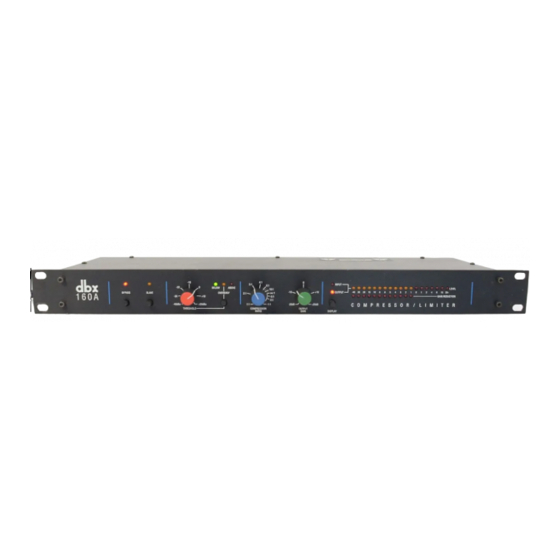- ページ 14
音楽機材 dbx 160AのPDF 取扱説明書をオンラインで閲覧またはダウンロードできます。dbx 160A 20 ページ。 Compressor limiter
dbx 160A にも: パンフレット&スペック (2 ページ)

dbx 160A COMPRESSOR / LIMITER
BYPASS
1 6 0 A
CONNECTING THE 160A TO YOUR SYSTEM
Basic Connection
85-3999-A 160AD front buyoff (5-20-98)
15 WATTS
A HARMAN INTERNATIONAL
COMPANY
SALT LAKE CITY, UTAH
MADE IN USA
100V
50/60Hz
MODEL 160A
120V
60Hz
COMPRESSOR/LIMITER
85-3998-A 160AD rear buyoff (5-20-98)
The 160A has balanced inputs and outputs, and can be used with any line-level device. Some common examples include:
mixing consoles, musical instruments, patch bays and other signal processors. For more specific cabling information, refer
to Installation Considerations, page 12.
For all connections, refer to the following steps:
1. Turn Off all equipment before making any connections.
2. Mount the 160A in a 1U rack space (optional).
The 160A requires one rack space (height) and 1 rack space (width). It can be mounted above or below anything that
doesn't generate heat, since it requires no special ventilation. Ambient temperatures should not exceed 95°F (35°C)
when equipment is powered .
Note: Avoid over-tightening of rackmounting screws as this could damage the front panel.
Caution: Never remove the cover. There are no user-serviceable parts inside, and you run the risk of an electric shock.
3. Make connections via XLR or 1/4" TRS jacks according to your requirements.
Typical patch points include: a mixer's channel or subgroup inserts when using the 160A on individual instruments or
tracks; the mixer's main outputs or bus inserts when mixing; an instrument preamp's effects loop when using the 160A
for guitar or bass; main outs of a submixer (e.g., keyboard mixer) as the signal is sent to main mixer; between a DAT's
output and an analog cassette input. When using a chain of processors, the 160A may be placed either before or after
effects or dynamic processors. However, if you are using the 160A for speaker protection, the compressor should be as
close to the amplifier as possible in the signal chain. We recommend you use common sense and experiment with dif-
ferent setups to see which one provides the best results for your needs.
4. Power On the unit: Securely connect the AC power cord to the unit and mains power.
Note: Check the line voltage. The unit is shipped for 115V or 230V, 50 or 60Hz operation. Refer to the unit's rear panel to verify your unit's precise line volt-
age.
Multi-Channel (Stereo) Connections
Two channels of program material do not necessarily constitute a stereo program. A stereo program is one where the two
channels are recorded and/or mixed to create the illusion of a single unified "panorama" of sound. The stability of the psy-
choacoustic "image" of each sound source within the stereo program depends upon its ability to maintain a specific phase
and amplitude relationship from left to right channel .
If two independent compressors are used to process the stereo program, a loud sound occurring in one channel will cause
the image to shift to the opposite side. This can be avoided by linking the two compressors in such a way that both chan-
nels receive the same amount of compression.
Stereo operation between two 160As can be accomplished by first "strapping" the two unit's together, i.e., by connecting
the rear panel STEREO STRAPPING jacks of each unit with a 1/4" TRS phone cable. Then, designate one of the two units
to be a "Master" (SLAVE button Out) and switch the other unit to "Slave" mode (SLAVE button In, SLAVE LED On).
The Master 160A will now respond to the combined inputs of the 160As. The Master's controls will adjust the amount and
nature of the compression and the Slave will track accurately to preserve proper stereo imaging.
Note: Remove the strapping cable if you want to use two 160As independently. When the SLAVE buttons on two strapped units are not depressed, the
160As do not operate independently because the "ring" of the strapping cable still sums the audio of each unit. The strapping cable must be removed for
proper single-channel operation. If both SLAVE buttons are depressed, both units will be bypassed (i.e., fixed at unity gain).
Note: A 160A unit cannot be strapped with a dbx 160XT, 160X, 160, 161 or 162 unit.
10
-10
3:1
-20
0
BELOW
ABOVE
2:1
SLAVE
OVEREASY
-30
+10
-40dBu
+20dBu
1:1
THRESHOLD
MANUFACTURED UNDER ONE OR MORE OF THE FOLLOWING U.S. PATENTS 4,234,804 4,316,107 4,329,598 4,331,931 4,377,792 4,403,199 4,409,500 4,425,551 4,434,380 4,454,433 4,471,324 4,473,793 OTHER PATENTS PENDING
INPUTS
BAL / UNBAL
4:1
0
6:1
INPUT
10:1
-10
+10
:1
OUTPUT
-40
-5:1
-2:1
-1:1
-20dB
+20dB
C O M P R E S S O R / L I M I T E R
COMPRESSION
OUTPUT
RATIO
GAIN
DISPLAY
OUTPUTS
UNBALANCED
XLR
GND
LIFT
BALANCED
BALANCED
LIFT
LEVEL
30
20
15
10
8
6
5
4
3
2
1
0
1
2
4
6
10
20+
GAIN REDUCTION
DETECTOR
METER
STEREO
XLR:
INPUT
CALIBRATION
STRAPPING
PIN 1
PIN 2
PHONE:
PIN 3
TIP
PHONE:
SLEEVE
TIP
RING
SLEEVE
TRS 160A ONLY
